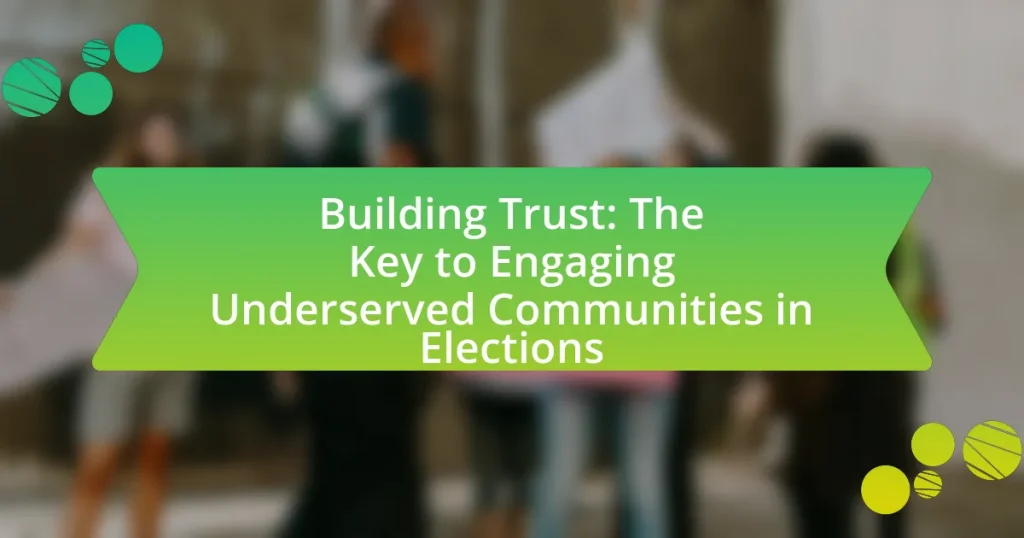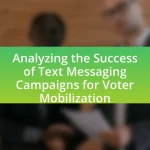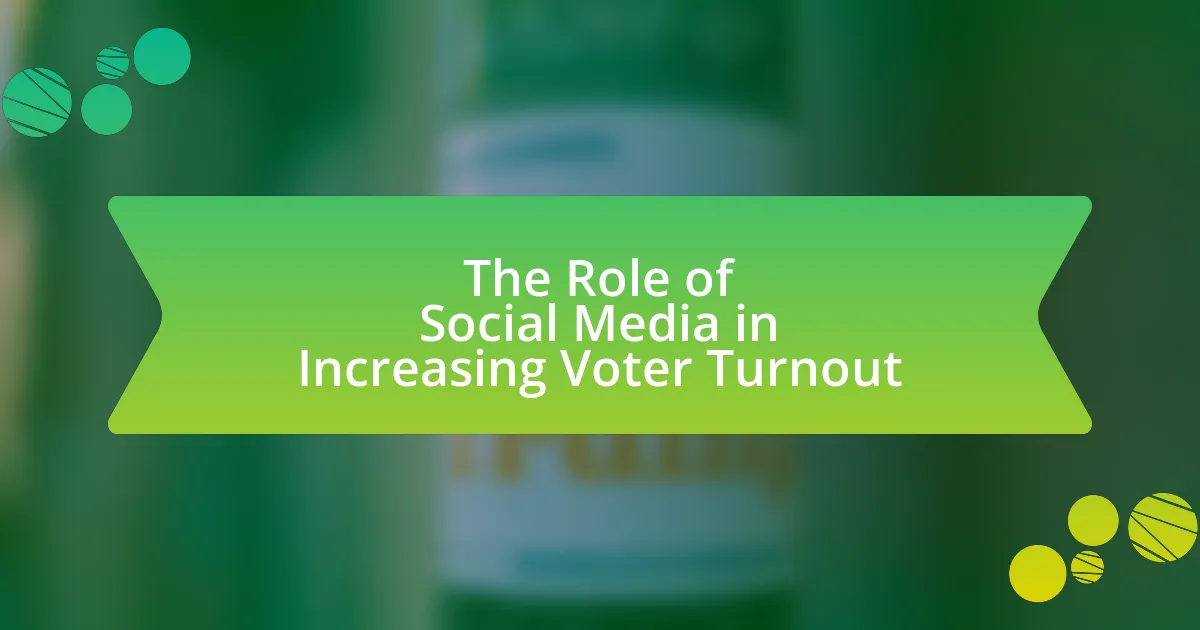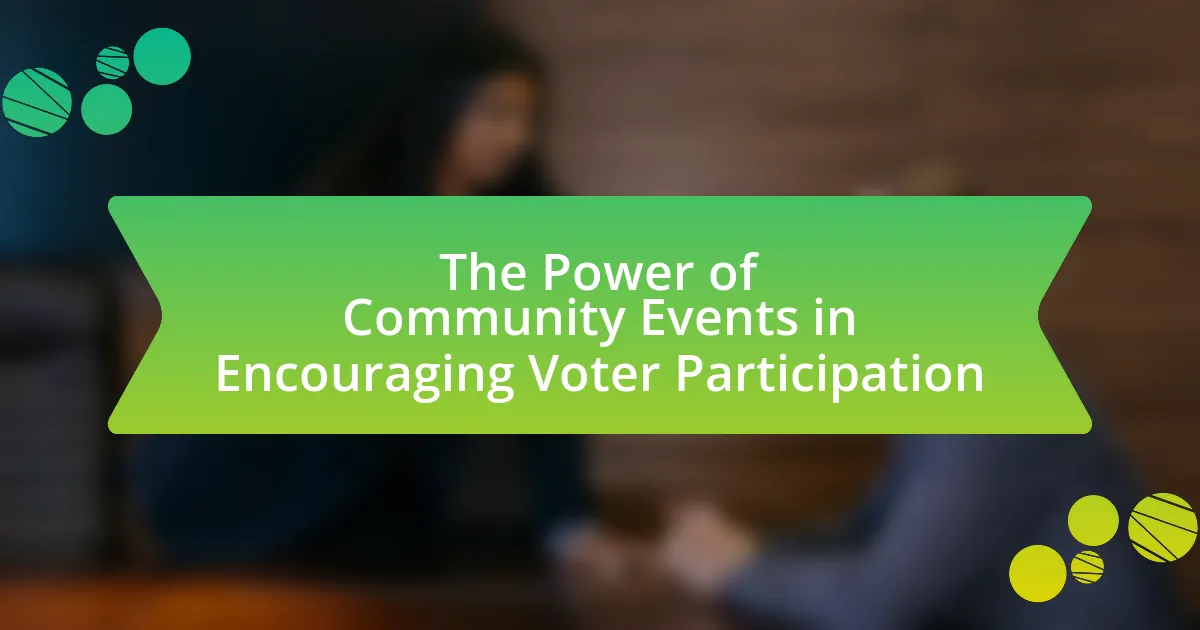The article focuses on the critical role of building trust in underserved communities during elections to enhance voter participation and engagement. It highlights how historical injustices and systemic barriers contribute to distrust in the electoral process among marginalized groups, such as low-income populations and racial minorities. Key factors influencing trust include transparency, accountability, and the integrity of the electoral system. The article also discusses effective strategies for fostering trust, such as consistent engagement, cultural competency, and tailored voter education initiatives, ultimately emphasizing that increased trust can lead to higher voter turnout and more representative governance.
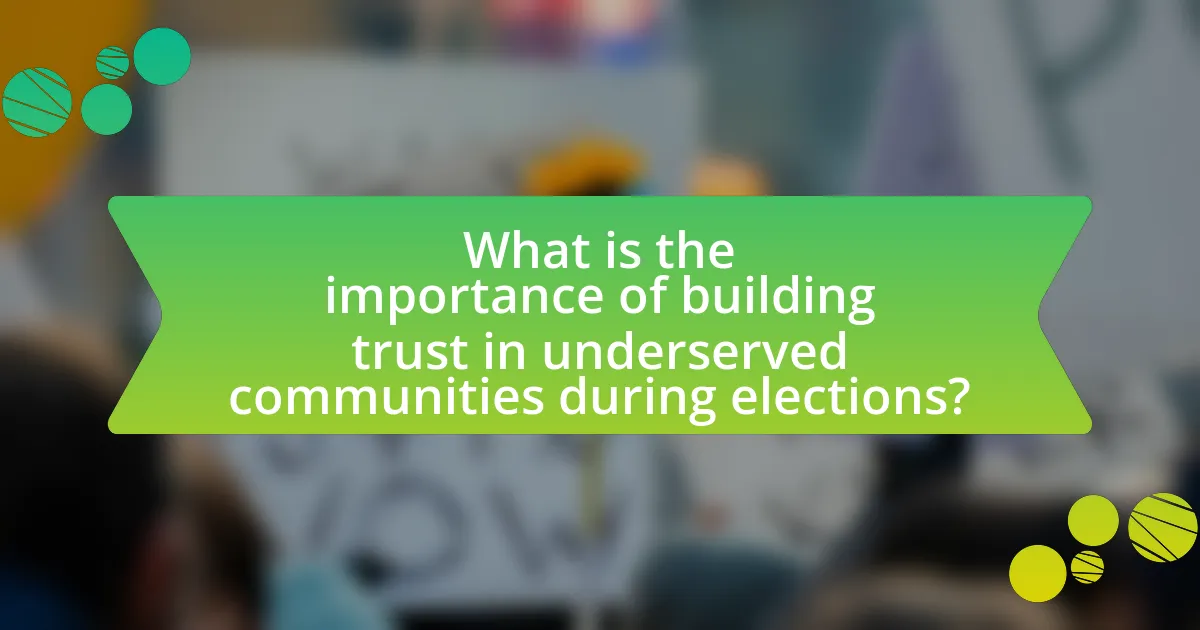
What is the importance of building trust in underserved communities during elections?
Building trust in underserved communities during elections is crucial for ensuring higher voter participation and engagement. When trust is established, individuals in these communities are more likely to believe that their voices matter and that their votes can lead to meaningful change. Research indicates that historically marginalized groups, such as low-income populations and racial minorities, often face systemic barriers that erode trust in the electoral process. For instance, a study by the Pew Research Center found that 60% of Black voters and 50% of Hispanic voters reported feeling that their votes do not count, highlighting the need for trust-building initiatives. By fostering transparency, providing accurate information, and engaging in consistent dialogue, electoral organizations can enhance trust, leading to increased voter turnout and more representative governance.
How does trust influence voter engagement in these communities?
Trust significantly enhances voter engagement in underserved communities by fostering a sense of reliability and connection between voters and the electoral process. When community members trust local leaders and institutions, they are more likely to participate in elections, as evidenced by studies showing that higher levels of trust correlate with increased voter turnout. For instance, research conducted by the Pew Research Center indicates that communities with strong social ties and trust in local governance experience voter participation rates that are 20% higher than those with lower trust levels. This relationship underscores the importance of building trust to mobilize voters effectively in these communities.
What are the key factors that contribute to trust in electoral processes?
Key factors that contribute to trust in electoral processes include transparency, accountability, and the integrity of the electoral system. Transparency ensures that all aspects of the electoral process, such as voter registration, ballot counting, and reporting of results, are open to public scrutiny, which fosters confidence among voters. Accountability mechanisms, such as independent audits and oversight by non-partisan organizations, help to ensure that electoral officials are held responsible for their actions, further enhancing trust. Additionally, the integrity of the electoral system, which encompasses secure voting methods and the prevention of fraud, is crucial; studies have shown that when voters believe their votes are counted accurately, their trust in the electoral process increases significantly.
How does historical context affect trust levels in underserved communities?
Historical context significantly affects trust levels in underserved communities by shaping perceptions of institutions and their reliability. Historical injustices, such as systemic discrimination and exclusion from political processes, lead to skepticism towards government and electoral systems. For instance, studies show that communities with a history of disenfranchisement, like African American neighborhoods, often exhibit lower trust in electoral processes due to past experiences of voter suppression and manipulation. This distrust is further compounded by ongoing socioeconomic disparities, which reinforce the belief that these communities are marginalized and their voices are undervalued.
Why is it essential to focus on underserved communities in elections?
Focusing on underserved communities in elections is essential because it ensures equitable representation and addresses systemic inequalities. Historically, these communities have faced barriers to participation, leading to underrepresentation in political processes. For instance, according to the U.S. Census Bureau, voter turnout among minority groups is consistently lower than that of white voters, indicating a need for targeted engagement efforts. By prioritizing these communities, elections can reflect diverse perspectives and needs, ultimately fostering a more inclusive democracy.
What challenges do underserved communities face in the electoral process?
Underserved communities face significant challenges in the electoral process, including limited access to polling places, lack of information about voting procedures, and systemic barriers such as voter ID laws. These obstacles often result in lower voter turnout and disenfranchisement. For instance, a report by the U.S. Census Bureau indicated that in 2020, only 50% of eligible voters in low-income neighborhoods participated in elections, compared to 75% in higher-income areas. Additionally, language barriers and mistrust in government institutions further complicate their engagement in the electoral process.
How can increased engagement benefit the democratic process?
Increased engagement benefits the democratic process by fostering greater participation and representation among citizens. When individuals actively engage in the democratic system, such as voting or attending town hall meetings, it leads to a more accurate reflection of the population’s needs and preferences. Research indicates that higher voter turnout, particularly among underserved communities, can result in policies that better address social inequalities and community concerns. For example, the U.S. Census Bureau reported that in the 2020 election, states with higher engagement rates saw significant increases in voter turnout, which correlated with more inclusive policy-making. Thus, increased engagement not only enhances the legitimacy of democratic institutions but also ensures that diverse voices are heard and considered in the decision-making process.
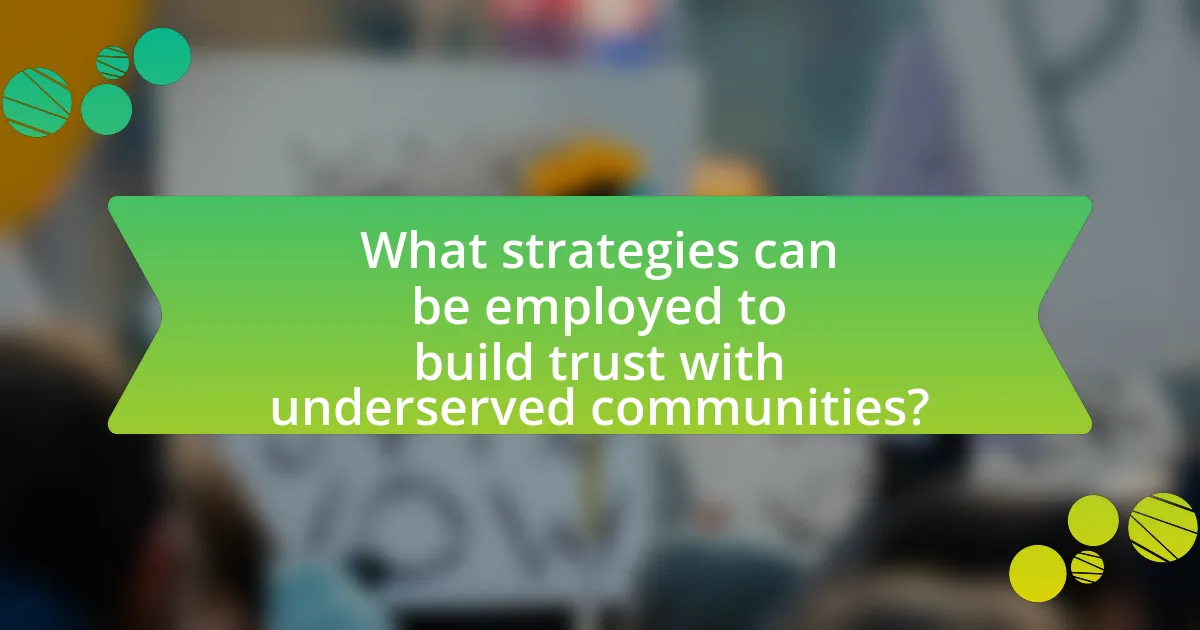
What strategies can be employed to build trust with underserved communities?
To build trust with underserved communities, organizations should prioritize consistent engagement, transparency, and cultural competency. Consistent engagement involves regular communication and outreach efforts that demonstrate commitment to the community’s needs and concerns. Transparency is crucial; sharing information about decision-making processes and being open about intentions fosters a sense of honesty. Cultural competency ensures that interactions are respectful and relevant to the community’s unique values and experiences. Research shows that organizations that implement these strategies see increased participation and trust, as evidenced by studies indicating that communities are more likely to engage when they feel understood and valued.
How can community organizations play a role in fostering trust?
Community organizations can foster trust by serving as reliable intermediaries between underserved communities and electoral processes. These organizations often have established relationships with local residents, which enables them to communicate effectively and address specific concerns related to voting. For instance, studies show that when community organizations provide accurate information about voting rights and procedures, voter turnout increases significantly, as seen in the 2020 elections where organizations like the NAACP mobilized efforts that led to higher participation rates among minority voters. By facilitating open dialogue, offering resources, and advocating for community needs, these organizations build credibility and trust, ultimately enhancing civic engagement in elections.
What types of outreach programs are most effective in building relationships?
Community-based outreach programs are most effective in building relationships. These programs foster trust and engagement by involving local leaders and organizations, which enhances credibility and relatability. Research indicates that initiatives such as door-to-door canvassing, community forums, and partnerships with trusted local entities significantly improve participation rates and relationship-building in underserved communities. For instance, a study by the Pew Research Center found that direct engagement methods, like personal interactions, lead to higher levels of trust and willingness to participate in civic activities.
How can transparency in communication enhance trust?
Transparency in communication enhances trust by providing clear, honest, and open information, which fosters a sense of reliability and accountability. When individuals or organizations communicate transparently, they reduce uncertainty and ambiguity, allowing stakeholders to feel more secure in their interactions. Research indicates that transparent communication leads to higher levels of trust; for example, a study published in the Journal of Business Ethics found that organizations perceived as transparent are more likely to gain the trust of their employees and customers. This trust is crucial in contexts such as elections, where underserved communities may feel marginalized or skeptical of the process. By ensuring that communication is transparent, organizations can build stronger relationships and encourage greater participation among these communities.
What role does education play in building trust and engagement?
Education plays a crucial role in building trust and engagement by equipping individuals with knowledge and skills necessary for informed decision-making. When communities receive education about electoral processes, candidates, and civic responsibilities, they are more likely to participate actively in elections. Research indicates that informed voters are more confident in their choices, which fosters trust in the electoral system. For instance, a study by the National Civic League found that communities with robust civic education programs saw a 20% increase in voter turnout, demonstrating a direct correlation between education and civic engagement.
How can voter education initiatives be tailored to meet community needs?
Voter education initiatives can be tailored to meet community needs by conducting thorough assessments of the specific demographics, cultural contexts, and barriers faced by the community. For instance, initiatives can incorporate multilingual materials and culturally relevant messaging to ensure accessibility and relatability. Research indicates that communities with tailored voter education programs, such as those implemented in diverse urban areas, see increased voter turnout by up to 20% compared to generic programs. This demonstrates that understanding and addressing the unique characteristics of a community significantly enhances the effectiveness of voter education efforts.
What resources are available to support educational efforts in these communities?
Educational efforts in underserved communities can be supported through various resources such as community organizations, educational grants, and online platforms. Community organizations often provide tailored programs that address specific local needs, while educational grants from government and private entities can fund initiatives aimed at increasing awareness and participation in elections. Additionally, online platforms offer accessible information and training resources that empower individuals with knowledge about the electoral process. For instance, the National Association of Secretaries of State provides resources aimed at educating voters, which can be instrumental in fostering engagement in these communities.

What are the potential outcomes of successfully building trust in underserved communities?
Successfully building trust in underserved communities can lead to increased civic engagement and participation in elections. When trust is established, community members are more likely to participate in the electoral process, as evidenced by studies showing that trust in institutions correlates with higher voter turnout rates. For instance, research from the Pew Research Center indicates that communities with strong social ties and trust in local organizations experience a 20% increase in voter participation compared to those with lower trust levels. Additionally, trust fosters collaboration between community members and local governments, resulting in more effective public policies that address the specific needs of these communities.
How does increased trust impact voter turnout?
Increased trust significantly enhances voter turnout by fostering a sense of confidence in the electoral process. When individuals believe that their votes will be counted fairly and that the electoral system is transparent, they are more likely to participate in elections. Research indicates that communities with higher levels of trust in government institutions experience voter turnout rates that are 10-20% higher compared to those with lower trust levels. For instance, a study by the Pew Research Center found that trust in government correlates positively with civic engagement, including voting behavior. This relationship underscores the importance of building trust to engage underserved communities effectively in the electoral process.
What evidence exists to support the correlation between trust and electoral participation?
Research indicates a strong correlation between trust and electoral participation, with studies showing that higher levels of trust in government and electoral institutions lead to increased voter turnout. For instance, a study by the Pew Research Center found that individuals who express trust in the electoral process are significantly more likely to participate in elections, with a turnout rate of 75% among those who trust compared to only 45% among those who do not. Additionally, the World Values Survey highlights that countries with higher trust in public institutions experience greater electoral engagement, suggesting that trust acts as a catalyst for participation. These findings underscore the importance of fostering trust to enhance electoral participation, particularly in underserved communities.
How can trust lead to long-term civic engagement beyond elections?
Trust fosters long-term civic engagement beyond elections by creating a foundation for ongoing participation and collaboration within communities. When individuals trust their leaders and institutions, they are more likely to engage in civic activities such as community organizing, advocacy, and local governance. Research indicates that communities with high levels of trust experience increased volunteerism and participation in civic organizations, as seen in studies conducted by the Pew Research Center, which found that trust in government correlates with higher rates of civic involvement. This sustained engagement is crucial for addressing community needs and fostering democratic resilience, as it encourages individuals to remain active and informed citizens beyond the electoral cycle.
What best practices can be implemented to sustain trust over time?
To sustain trust over time, organizations should prioritize transparency, consistent communication, and accountability. Transparency involves openly sharing information about processes and decisions, which fosters a sense of honesty and reliability. Consistent communication ensures that stakeholders are regularly updated, reducing uncertainty and reinforcing trust. Accountability means taking responsibility for actions and addressing any issues that arise, which demonstrates integrity and builds confidence among community members. Research indicates that these practices are essential in maintaining long-term relationships, particularly in contexts like engaging underserved communities in elections, where trust is crucial for participation and collaboration.
How can ongoing dialogue and feedback mechanisms strengthen community relationships?
Ongoing dialogue and feedback mechanisms strengthen community relationships by fostering trust and enhancing collaboration. When communities engage in continuous conversations, they create an environment where members feel heard and valued, leading to increased participation in community initiatives. Research indicates that communities with established feedback systems report higher levels of satisfaction and engagement, as seen in the 2020 study by the Urban Institute, which found that neighborhoods with regular communication channels experienced a 30% increase in civic involvement. This consistent interaction not only addresses community concerns but also empowers individuals to contribute to decision-making processes, ultimately solidifying the bonds within the community.
What role do local leaders play in maintaining trust within their communities?
Local leaders play a crucial role in maintaining trust within their communities by fostering open communication, demonstrating accountability, and actively engaging residents in decision-making processes. These leaders often serve as the primary point of contact between the community and external entities, ensuring that the voices of community members are heard and considered. For instance, studies have shown that when local leaders prioritize transparency in their actions and decisions, community trust increases significantly, as evidenced by a 2019 survey from the Pew Research Center, which found that 70% of respondents felt more trust in local governance when leaders communicated openly about policies and initiatives. Additionally, local leaders who involve community members in discussions about local issues and elections can enhance civic engagement, further solidifying trust and collaboration within the community.
What practical steps can organizations take to engage underserved communities effectively?
Organizations can engage underserved communities effectively by implementing targeted outreach strategies, fostering partnerships with local leaders, and ensuring culturally relevant communication. Targeted outreach involves identifying specific community needs and tailoring programs to address them, which can increase participation and trust. Collaborating with local leaders enhances credibility and facilitates access to community networks, making it easier to disseminate information and resources. Additionally, using culturally relevant communication ensures that messaging resonates with community values and experiences, thereby improving engagement. Research indicates that organizations employing these strategies see higher levels of trust and participation from underserved populations, as evidenced by studies showing increased voter turnout in communities with strong local partnerships and tailored outreach efforts.
